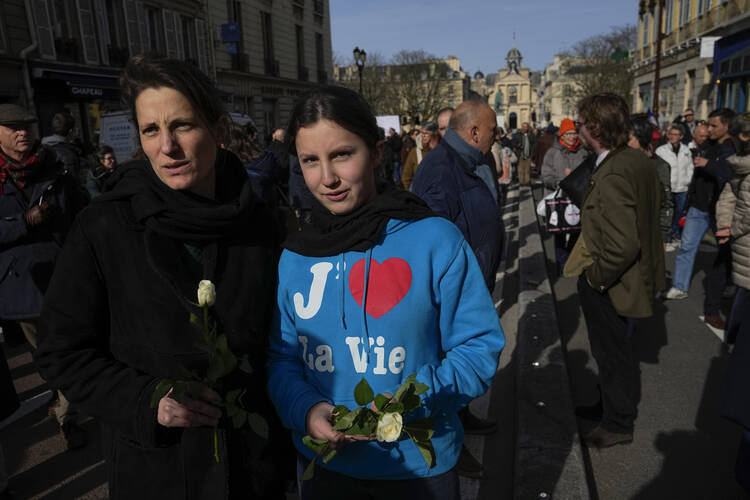After France became the first country in the world to enshrine abortion as a “guaranteed freedom” into its constitution, leaders from both the French and European pro-life movements say they are mobilizing to counteract the unprecedented move.
In some ways, the strategies they plan are neither new nor different, as the possibility of passing new restrictions on abortion in France has long been slim. Just two years ago, the cut-off for abortion in France was extended from 12 weeks to 14 weeks. The constitutional measure passed on March 4 by a vote of 780 to 72 in a joint session of the National Assembly and the Senate. Almost no politicians or political parties in France favor new limits on abortion.
But the latest move to protect abortion access has inspired pro-life leaders to redouble efforts where they can be successful. In the current context, their next moves include campaigns to promote pro-family public policy and legislation that will create alternatives to abortion.
Proposing and supporting social policies that support women facing unexpected pregnancies or facilitate adoption that may mean fewer abortions “is more necessary than ever,” said Caroline Roux, president of France’s Alliance Vita. “We must continue to raise awareness of the reality of abortion,” she said.
Pro-life groups point out that abortion rates in France have been trending higher, in contrast to the declining rates experienced by many other countries around the world and a regional trend that has seen abortions in Europe generally decline since the 1990s. Ms. Roux said that in the most recent data available from the French health service in 2022, the number of abortions performed in France was the highest ever recorded at 234,300.
The causes for the rise in abortions in France are not clear, according to pro-life groups, though Ms. Roux points to evidence that poverty and domestic violence are factors consistently at play in a decision to terminate a pregnancy.
One study found that in 23 percent of cases, women sought an abortion because they had suffered violence, either because of rape or domestic violence. Violence against women in France at the hands of a spouse or partner often begins during a first pregnancy or can be exacerbated during pregnancy. And a 2020 study by the French public health service found higher rates of abortion among poor women, suggesting that partner abuse and poverty are strong drivers of abortion that could be countered with better social policy.
“A lot of abortions could be avoided with the right support,” Ms. Roux told America. “It is clear that not all women have abortions freely and by choice, but because they lack alternatives and safety.”
Ms. Roux said that in addition to its longstanding efforts to provide direct support to women in unplanned or difficult pregnancies, Alliance Vita plans to “launch a campaign focused on the links between abortion and the pressure, violence and discrimination faced by women at the start of pregnancy.”
Other pro-life groups are organizing similar efforts. Nicolas Tardy-Joubert, president of the Paris-based Marche Pour La Vie, said his organization is campaigning for a parliamentary investigation into the causes and consequences of abortion in France. He added there is wide public support for such a study.
“What we want to do is wake up our consciences and change hearts and minds. That is our main objective,” he said. “We are not giving up.”
French pro-life groups have the support of other European pro-life organizations.
“Instead of narratives that divide women from children, we support the campaigns of our member associations,” Vincent Bassi, president of the Federation of Catholic Family Associations in Europe, said. “Families are not a cost to society, but rather an investment. In these times of isolation, families bring intergenerational solidarity. In times of depression, families bring compassion. In times of darkness, families bring hope.”
The group’s French member association, the National Federation of Catholic Family Associations, not only provides direct services to families but also promotes the social benefits of families and advocates for stronger public policy and financial support for motherhood. The French association is promoting an ambitious family policy plan that includes more equitable state benefits for larger families, improved flexibility for maternity leave and stronger consideration of the time dedicated to motherhood in calculating state pension benefits.
On the other side of the Pyrenees, the One of Us Foundation is organizing an event in Spain to demonstrate its opposition to the French constitutional change and its support of pro-life groups.
“In Spain, we’re going to organize an action against this declaration with all of the Spanish and European pro-life associations that want to unite in defense of fundamental [human] rights, whose birthplace is Europe,” Ana del Pino, executive director of One of Us, told America. “We reject and cannot permit that Europe, which has been the cradle of fundamental rights, turns into its casket.”
Noting that some European leaders have hailed the French constitutional change, Ms. Del Pino sees a risk that the French move will inspire similar constitutional campaigns in other countries. Mr. Bassi likewise fears a ripple effect.
“The claim being made by pro-abortion legislators in France is that abortion is a human right. No such [human right] exists—this is established by the European Court of Human Rights,” he said. Now “we must not be surprised if similar changes are attempted in other countries on the continent.”
Mr. Bassi explained that growing social polarization and political populism—on both the left and the right—could encourage other political leaders to follow French President Emanuel Macron’s political lead. Mr. Macron argued that the constitutional change was necessary to create an obstacle to a legislative or judicial turnabout on abortion access like the one being experienced in the United States after the Supreme Court overturned Roe v. Wade in June 2022.
But the president’s critics charge that the effort to have abortion declared a constitutional right did not emerge because of an actual political threat to abortion access in France, as much as it reflected a campaign to shore up support for the Macron presidency. Abortion access is already well-protected in France. Having scored a win among pro-choice voters with this addition to the constitution, Mr. Macron on March 11 proposed a new “aid in dying bill” that would allow adults facing end-of-life illness to take lethal medication, a first in the country.
Ms. Roux believes few other European states will go as far as France.
“This new legislation may indeed give ideas to few other European countries, but I don’t think it will affect a lot of countries,” she said. “Pro-abortion movements in France are pushing for the right to abortion to be enshrined in the European Union’s Charter of Fundamental Rights, but this is far from a consensus,” she said.
She also points out that under its founding treaty, the European Union does not have the power to regulate abortion—that remains in the hands of each member state.
But pro-life groups have no intention of letting their guard down.
“We lost this battle,” Mr. Tardy-Joubert said, “but we aren’t giving up.”








